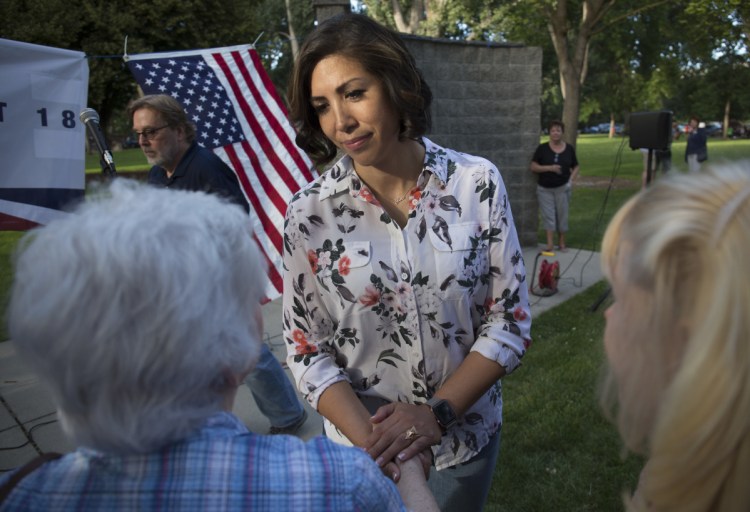BOISE, Idaho — Democrat Paulette Jordan breaks the mold of the typical Idaho candidate.
She’s the first woman to win her party’s nomination for governor of a state that hasn’t elected a Democrat to the top seat in almost 30 years. And if she pulls off the upset against Lt. Gov. Brad Little in November, Jordan, a member of the Coeur d’Alene tribe, will be the first Native American governor of a U.S. state.
It won’t be easy. It’s tough being a Democrat in Idaho, grappling with a lack of legislative influence inside the Statehouse and consistently losing against far-right statewide and congressional opponents. The last time Idaho voters elected a Democrat for governor was in 1990.
Former four-term Gov. Cecil Andrus is white, male and Mormon – all key characteristics in a state that has the second-highest Mormon population outside Utah. On social issues he appealed to conservative voters by being pro-gun and anti-abortion.
Jordan, 38, promotes better gun control and advocates for expanding Medicaid. She’s a former two-term state representative with a long history of working on the tribal council. She’s drawn national media attention and progressives have billed her as a new face of the Democratic Party.
In the May 15 Democratic primary, Jordan crushed her 74-year-old opponent, A.J. Balukoff, by securing nearly 60 percent of the vote. Jordan’s supporters broke election turnout expectations, forcing county clerks to rapidly print ballots the day of the primary to keep up with demand.
When results were finally announced later that night, Jordan stood in front of an adoring crowd, dancing and singing along to music at a party she hosted several blocks down from the Idaho Democratic Party’s more demure gathering.
But questions swirl around her campaign’s ability to pull off an upset over Little in November.
During the final weeks building up to the primary, Jordan’s campaign imploded with the loss of key staffers who left despite their initial strong allegiance to the candidate. The departures came at a time when she had no endorsements from current or former Democratic lawmakers.
Distancing herself from simply being a party loyalist could pay off in Idaho, said Jaclyn Kettler, a Boise State University political scientist.
“In a state that values independence and individualism, that makes sense,” Kettler said. “Not being beholden to a party can be an attractive thing to a voter when evaluating a candidate.”
The numbers are also stacked against Jordan. While roughly 65,000 Idahoans voted in the Democratic primary, more than 194,000 voters cast a ballot in the Republican primary that only allows registered Republicans to participate.
Jordan downplayed those concerns in a recent interview, saying people are ready for fresh solutions to Idaho’s longstanding challenges.
“My goal is to create one Idaho,” Jordan said. “I’m not going anywhere. My children are here, and when I say my children, I consider all children in Idaho my children. Striving for a better future is not a partisan issue.”
Jordan listed two top priorities if elected: improving education – particularly by boosting teacher pay for K-12, creating a universal preschool program and reducing the costs of college tuition – and expanding access to health care throughout the state.
However, just how Jordan plans on implementing or funding those efforts remains unclear.
During the primary campaign, Jordan pointed to the legalization of marijuana as a possible way to spike tax revenue to help cover the costs of her proposals. The benefit would be twofold, she argued, because it would create a new revenue source while also freeing up funds that have increasingly gone to Idaho’s growing prison population.
Send questions/comments to the editors.



Success. Please wait for the page to reload. If the page does not reload within 5 seconds, please refresh the page.
Enter your email and password to access comments.
Hi, to comment on stories you must . This profile is in addition to your subscription and website login.
Already have a commenting profile? .
Invalid username/password.
Please check your email to confirm and complete your registration.
Only subscribers are eligible to post comments. Please subscribe or login first for digital access. Here’s why.
Use the form below to reset your password. When you've submitted your account email, we will send an email with a reset code.